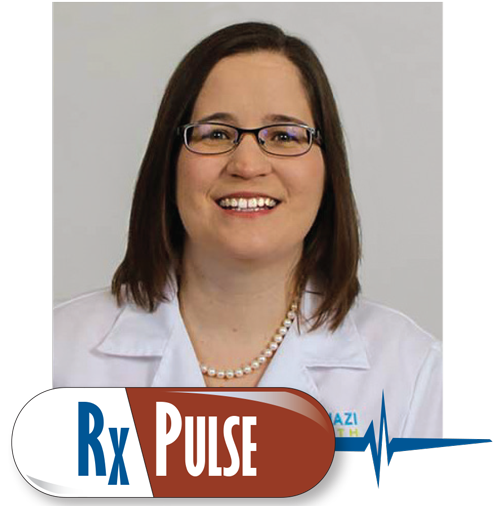 |
By Emily Zarse, MD
Assistant Professor of Clinical Psychiatry
Indiana University School of Medicine |
Across the United States, it is now widely known that we are deep in the midst of an opioid epidemic. In Indiana, we are ranked as one of the worst states for access to medication-assisted treatment (MAT) in relation to our high demand.
[1] The Richard M. Fairbanks School of Public Health at Indiana University published a comprehensive report on our state’s substance use in April 2017, and it is well worth a look.
[2]
However, comprehensive addiction treatment is a complicated endeavor to roll out as quickly and efficiently as necessary to combat not only the opioid epidemic, but other ongoing addictions people are suffering from throughout the state. As an addiction psychiatrist, I would love to be able to provide these services to all of the patients in need, but I am only the 10th addiction psychiatrist to be trained in Indiana. We need innovative programming for medical education and treatment in order to have a fighting chance against something that is killing so many of our patients.
At Eskenazi Health, the safety net hospital for Marion County, we are exploring all options for training providers in the treatment of opioid use disorders. Providers have asked for ongoing education on screening and treatment of opioid use disorders to sustain what gains we’ve made. To achieve this, we plan to implement collaborative teaching through a web-based platform called Project ECHO.
The University of New Mexico started ECHO projects as a way to expand access to treatment in a variety of disciplines. Its website describes Project ECHO as “a lifelong learning and guided practice model that revolutionizes medical education and exponentially increases workforce capacity to provide best-practice specialty care and reduce health disparities.”
[3] Expert teams deliver virtual training sessions to a variety of sites through teleconferencing and case-based discussion. At Eskenazi, we plan to create a team of providers to provide ongoing training to our primary care sites, and, eventually, throughout the entire health care system. Indiana University School of Medicine has a similar opioid ECHO and is extending its program throughout Indiana.
Project ECHO will build on other recent initiatives to expand MAT and related services for opioid patients in the Indianapolis area. In 2017, the Indianapolis Emergency Medical Service (EMS) treated 2,130 people for opioid overdoses, and Eskenazi’s ED treated around 900 of these. Krista Brucker, MD, an emergency medicine physician at Eskenazi Health, started Project POINT to bridge these patients to treatment. The program provides naloxone kits, as well as assistance in obtaining insurance coverage, resources for treatment and housing, outreach and follow-up. This program has been remarkable in increasing access to services and retention in long-term addictions treatment. There is still a large gap in MAT services for these patients and the thousands more in Marion County that do not have access to treatment due to a shortage of treatment providers, and Project ECHO will help meet this need.
As the area chief of addiction psychiatry services for Midtown Community Mental Health, I also work with psychiatrists, primary care physicians, advanced practice nurses and other providers to expand MAT through buprenorphine prescribing. At Eskenazi, we have already hosted two buprenorphine waiver trainings and have added more than 20 new waivered prescribers since June 2017. To support these providers, we have addictions-trained social workers and mental health clinicians embedded in primary care clinics. The clinicians do comprehensive mental health and addictions assessments and screen for risk of opioid prescribing, as well as appropriateness of buprenorphine treatments. They coordinate the urine drug screening process, obtain INSPECT reports, review and sign treatment agreements and provide ongoing addictions therapy. Providers are then able to focus on prescribing buprenorphine with as much information as possible to guide them.
These efforts are a great start to helping Hoosiers overcome addiction to opioids. Project ECHO is one more tool to reverse the negative trends in our population’s health and, in turn, bring more parents back to their children, improve unemployment, reduce incarceration, and give those fighting addiction a life they can enjoy and be proud of again.
If you are interested in joining an ECHO or starting a new one on any topic, please visit the University of New Mexico's
ECHO website and click on "Join the Movement" in the top menu bar.
[1] Jones, C.M., et al., National and State Treatment Need and Capacity for Opioid Agonist Medication-Assisted Treatment. Am J Public Health, 2015. 105(8): p. e55-63.
[1] Jones, C.M., et al., National and State Treatment Need and Capacity for Opioid Agonist Medication-Assisted Treatment. Am J Public Health, 2015. 105(8): p. e55-63.
[2] Balio, C., et al., Substance Abuse Trends in Indiana. Improving Community Health Through Policy Research. IUPUI Center for Health Care Research. April 2017
[3] Project ECHO: A Revolution in Medical Education and Care Delivery. [www.echo.unm.edu]
Note: This article expresses the personal views of the author and not ISMA.